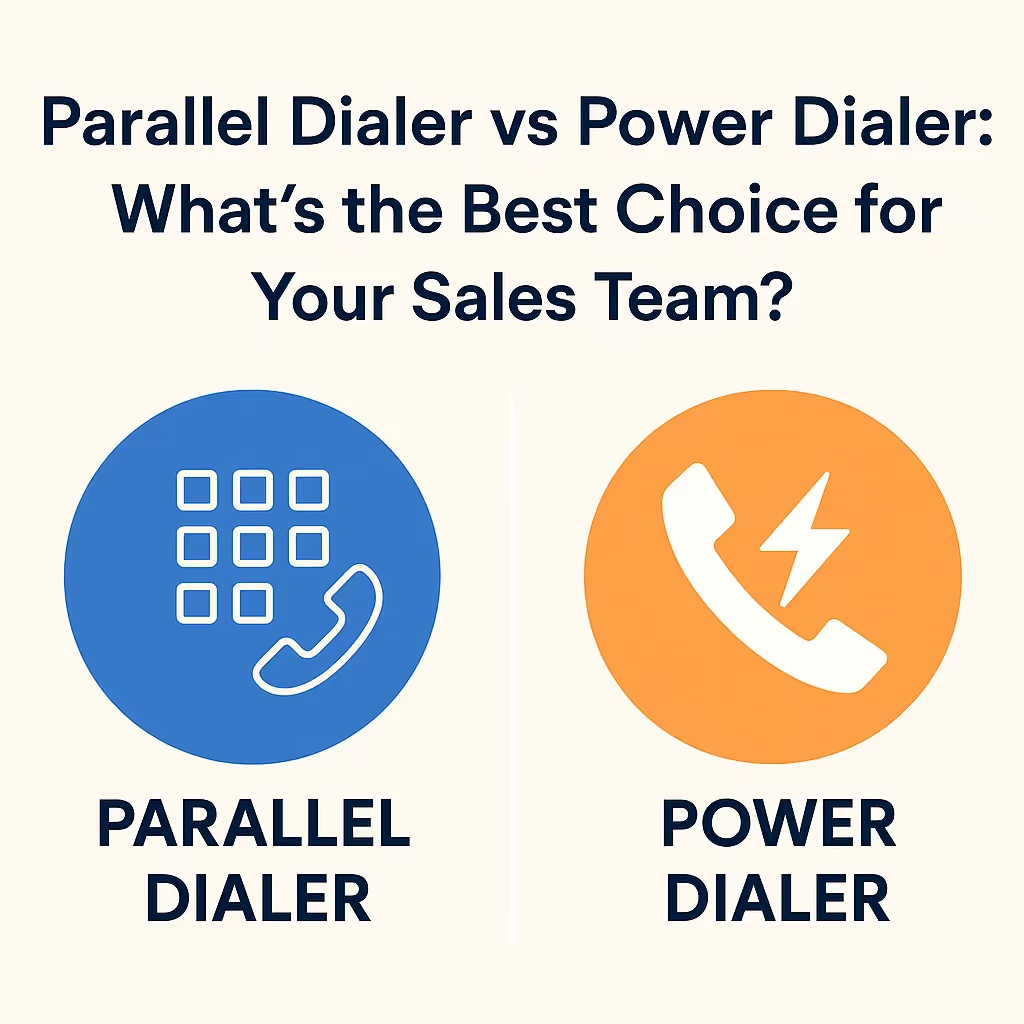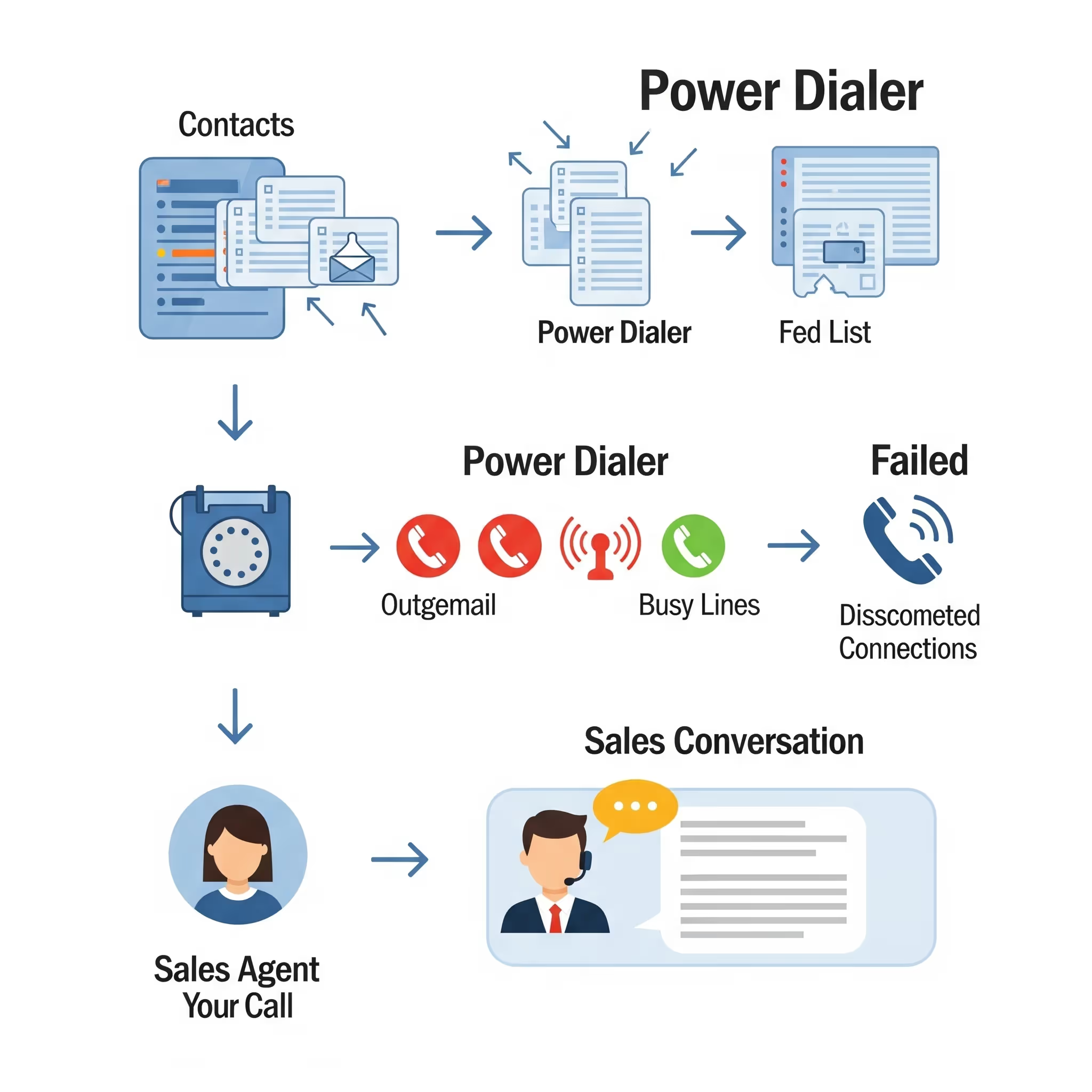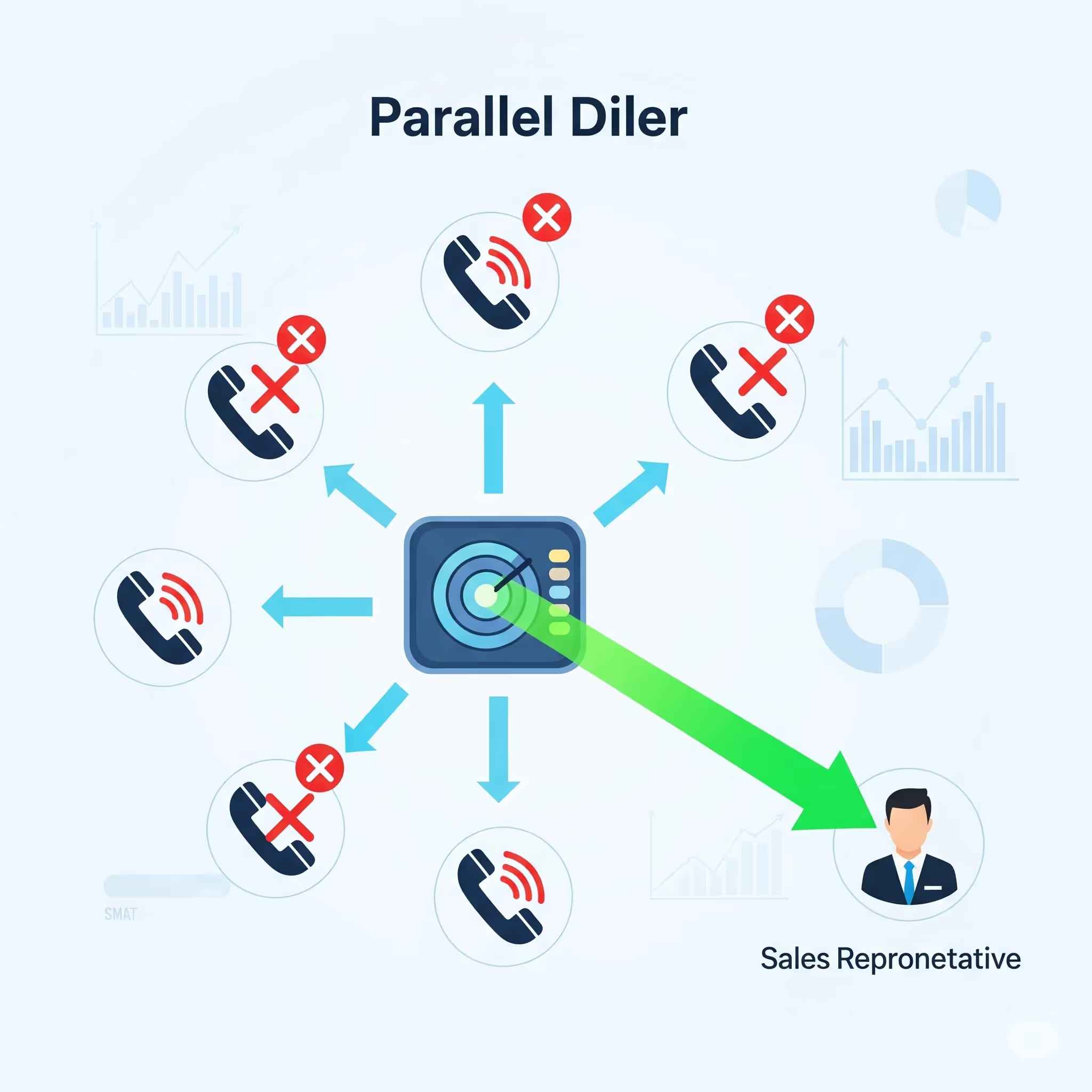
Parallel Dialer vs Power Dialer: Best Choice for Sales Teams
Summary:
Picking the right dialer tool can seriously impact how well your sales team performs. In this simple guide, we break down the key differences between power dialers and parallel dialers, so you can choose the one that actually fits how your team sells. Whether you're making lots of quick calls or focusing on more personal, quality conversations, we’ve got you covered.
What you’ll learn: Call Volume vs. Call Quality how each dialer handles speed and depth, Rep Productivity this tool helps your team get more done, Compliance & Call Rules stay within the lines while scaling, Real-World Pros and Cons the good, the bad, and the trade-offs, best Fit for Your Team it works best for high-volume vs. relationship-based outreach. If you’re a sales leader looking to scale smarter (not just faster), this guide will make your dialer decision a whole lot easier.

I've been managing sales teams for over a decade, and I can tell you that choosing between a parallel dialer and a power dialer is one of those decisions that keeps sales managers up at night. Get it wrong, and you'll watch your team struggle with frustrated prospects, compliance headaches, and missed quotas. Get it right, and you'll wonder how you ever survived without it.
The truth is, most companies make this choice based on flashy demos or what their competitor uses. But these two systems work so differently that what saves one company could sink another. Let me guide you through what truly matters when making this decision.
What Auto Dialer Software Does for Your Team
Before we had auto dialer software, my reps spent maybe 20% of their day talking to prospects. The rest was dialing, waiting, getting voicemail, hanging up, finding the next number, and starting over. Good reps might connect with 25-30 people if they worked their tails off.
Now the computer handles all that busywork. Your reps focus on what they do best - selling. But here's where it gets tricky. Not all dialers work the same way. Some blast through numbers like a machine gun. Others take a more measured approach. The difference affects everything from how stressed your reps get to whether you end up in legal trouble.
Modern systems also bring features like CRM integration, answering machine detection, and call recording. The best call center dialer software even uses call pacing technology to adjust speed based on how many agents you have available. These features matter, but they're not what determines success or failure.
What Is a Power Dialer?

If you've ever spent hours dialing one number after another, waiting through rings and voicemails, you know how repetitive sales outreach can be. That’s where a power dialer comes in.
A power dialer is a tool that automates the dialing process, but in a smart, human-paced way. Instead of bombarding multiple numbers at once like some high-pressure systems, it dials one lead at a time, giving you a brief window to glance at their profile, gather your thoughts, and get ready to talk.
It’s like having a personal assistant who tees up your next call the second you hang up the last one.
Key Benefits Driving Adoption
Sales teams who care about conversations, not just call volume, gravitate toward power dialers. Why? Because they strike the perfect balance between speed and quality.
You still move faster than manual dialing, but you’re not sacrificing preparation or personalization. It helps reps stay focused, confident, and in control, without the chaos of handling multiple calls at once.
How Power Dialers Help Sales Teams Perform Better
- Saves time without cutting corners – no need to type in numbers or toggle tabs.
- Gives you a moment to prep – usually 15–20 seconds to check CRM notes or past interactions.
- Logs everything – outcomes, notes, and follow-ups go straight into your CRM.
- Helps you sound more natural – you’re not caught off guard by a surprise connection.
- Reduces stress – fewer mistakes, less rush, better conversations.
Pros and Cons of Power Dialers
Like any sales tool, power dialers come with both strengths and limitations. Understanding where they shine and where they fall short can help you decide if it’s the right fit for your team.
Advantages of Power Dialers
- More control over each conversation: Since calls are made one at a time, reps have time to gather their thoughts and approach each conversation with purpose.
- Higher conversation quality: The ability to prepare between calls leads to better rapport, stronger pitches, and more meaningful interactions.
- Built for personalization: Ideal for relationship-based selling, where context and tone matter just as much as timing.
Potential Drawbacks
- Lower call volume: Power dialers prioritize quality over speed, so you won’t hit the same daily numbers as with parallel or predictive dialers.
- Idle time risk: If your lead list has low connect rates, reps might spend more time waiting between calls.
- Less suited for high-volume outreach: For campaigns that rely on quick, simple pitches to hundreds of leads, a power dialer may feel too deliberate.
Ideal Use Cases for Power Dialers
Power dialers are a go-to for teams handling B2B sales, complex offers, or relationship-based selling. If your reps need to sound sharp, listen actively, and personalize their pitch, this tool works with that flow.
It’s also great for onboarding new hires. With a gentler learning curve than high-speed dialers, most new reps are up and running in under two weeks.
What Is a Parallel Dialer?

A parallel dialer works like a numbers game. It calls multiple people simultaneously - maybe 3, 5, or even 8 at once. Whoever answers first gets connected to your rep. Everyone else who answered gets hung up automatically.
The system uses smart algorithms to decide how many numbers to dial at once. It considers things like time of day, answer rates in your area, and how many reps are available. The goal is to keep everyone busy without creating too many dropped calls.
Why High-Volume Sales Teams Prefer Parallel Dialers
Parallel dialers maximize talk time. Instead of waiting for phones to ring, your reps spend almost their entire shift talking to prospects. I've seen teams complete 200-300 conversations daily using this approach.
This works great for time-sensitive campaigns. When I managed political cold calling operations, we needed to reach thousands of voters before election day. Parallel dialers made that possible. Same with market research - when you need survey responses fast, volume matters more than personalization.
Some reps thrive on the constant activity. They like feeling busy and productive all day long. The numbers can be addictive when you're connecting with people nonstop.
Common Pitfalls and Drawbacks of Parallel Dialers
Dropped calls create angry prospects. When your system calls 5 people and 2 answer, one gets connected and one gets hung up on. That person might never give your company another chance. I've seen businesses damage their reputation this way.
Legal issues are real, too. The FCC limits how many calls you can abandon. Too many drops and you'll face fines. Some industries can't risk this exposure at all.
Your reps also get less preparation time. Since they never know which of the 5 people will answer, they can't research specific prospects beforehand. Conversations become more generic and less effective.
The Real Differences That Matter
Let me break down what affects your day-to-day operations and results.
Speed vs. Quality Trade-offs
Power dialers help most reps complete 80-120 meaningful calls per day. If you're selling complex services where conversations last 10-15 minutes, expect to be on the lower end. But those conversations tend to be higher quality.
Parallel dialers can push those numbers to 200-300+ calls daily. However, many of these will be brief interactions. The system prioritizes connections over conversation depth.
Here's what I learned: A rep making 100 quality calls with a 5% conversion rate generates 5 opportunities. A rep making 250 rushed calls with a 1.5% conversion rate only creates 3.75 opportunities. More isn't always better.
How Each System Affects Your Team
Power dialers create sustainable work environments. Your reps can maintain energy and enthusiasm throughout their shift because they're not constantly under pressure. I've noticed better job satisfaction and lower turnover with this approach.
Parallel dialers create intense environments that affect people differently. Some experienced reps love the fast pace and achieve great results. Others burn out quickly or make mistakes due to constant pressure.
New reps almost always do better with power dialers initially. The extra time between calls helps them learn scripts, handle objections, and build confidence. You can always move them to parallel dialing later as they improve.
CRM Integration Reality
Both systems work with major CRMs like Salesforce, HubSpot, Odoo, and GoHighLevel. But they handle data very differently.
Power dialers give reps time to update records properly. They can add detailed notes, schedule follow-ups, and keep accurate contact information. This creates valuable data for your sales team over time.
Parallel dialers focus on activity metrics rather than detailed documentation. The fast pace makes comprehensive note-taking nearly impossible. Most teams track guide to better call connect and pickup rates, connection rates and basic outcomes instead of conversation details.
Compliance Headaches You Can't Ignore
Power dialers have fewer compliance risks because they follow a controlled approach. Calling one person at a time makes it easier to manage consent, respect preferences, and maintain accurate records.
Parallel dialers create compliance challenges you need to plan for. Every dropped call counts as an "abandoned call" under FCC regulations. Too many and you'll face penalties. Some industries simply can't take this risk.
Choosing the Right Fit for Your Sales Strategy
Your choice should match your real situation, not what sounds good in theory.
Power Dialers Work Best When:
You're selling complex stuff. B2B software, consulting services, and expensive equipment - these sales require understanding each prospect's specific situation. Power dialers give reps time to prepare for these consultative conversations.
Relationships matter. Insurance agents, real estate pros, and financial advisors - they all depend on trust and rapport. The extra preparation time helps them approach each prospect appropriately.
Regulations are strict. Healthcare, finance, and legal services - these industries often choose power dialers because compliance violations cost too much. The controlled approach reduces legal risks significantly.
Your team is learning. New reps perform better with power dialers' manageable pace. They can focus on improving their skills without feeling overwhelmed by the system.
Parallel Dialers Excel When:
Speed matters most. Political campaigns, time-sensitive promotions, urgent market research - these situations require reaching the maximum people in the minimum time.
The message is simple. Appointment setting, survey calls, basic information gathering - when the conversation follows a script, parallel dialers' volume approach works well.
Your team is experienced. Veteran reps who thrive under pressure often prefer the constant activity and higher numbers that parallel dialers provide.
Volume drives results. Some businesses succeed through sheer numbers rather than relationship building. If your model works this way, parallel dialers might fit.
Real Comparison Based on Experience
Which Dialer Should You Choose? Key Considerations
Stop guessing and start analyzing your real situation with these questions.
What's your average deal worth? Higher-value sales usually justify the time investment that power dialers support. If you're selling $50,000 software licenses, take time for preparation. If you're booking $200 consultations, volume might matter more.
How complicated is your sales process? Multiple decision-makers, demos, proposals, long cycles - these typically need power dialers. Quick yes/no decisions can work with parallel dialers.
What's your team's experience? New reps need a power dialer's controlled pace to learn and improve. Experienced reps might prefer parallel dialers' higher activity levels.
How strict are industry rules? If compliance violations could cost thousands in fines, power dialers are usually safer. Less regulated industries have more flexibility.
What does your competition do? If they're using aggressive parallel dialing, you might need it to compete on volume. If they focus on relationships, power dialers might differentiate you.
Platforms That Give You Options
Smart companies don't lock themselves into one approach forever. Tools like Power Dialer.ai let you switch between power and parallel dialing based on campaign needs, prospect types, or rep preferences.
This flexibility helps when you're running different types of campaigns simultaneously. Use power dialing for high-value prospects and parallel dialing for broader lead qualification or market research.
Ready to test both approaches with your actual team? Book a demo with Power Dialer.ai and see which method delivers better results for your specific situation.
Why Power Dialer.ai Actually Works
Most dialer companies force you to pick one method and live with it. Power Dialer.ai recognized that different situations need different strategies.
Features That Help:
The platform learns your team's patterns and adjusts accordingly. It figures out when your reps perform best and optimizes call pacing automatically, whether you're using power or parallel dialing.
Modern dialers, especially power dialers, are built to integrate directly with your CRM without requiring developer support or complex setups. This means your reps can log calls, update records, and trigger workflows automatically, no tickets to IT required. More importantly, top-tier systems are designed with TCPA compliance guidelines in mind, ensuring that every outbound interaction respects consent laws, call time restrictions, and opt-out protocols. That’s one less legal headache and one more win for your team’s productivity and peace of mind.
Let me know if you want this localized or adapted to a specific CRM like Salesforce, Odoo, or GoHighLevel.
Compliance monitoring runs in the background constantly. The system tracks call abandonment rates, consent management, and other critical metrics automatically. You'll know about problems before they become expensive.
Real-time analytics show what's working. You can see which approach generates better results for different prospect types and adjust your strategy based on real data instead of guesses.
My Recommendation After Years of Testing
Most companies should start with power dialers and add parallel capabilities later if needed. Here's why this approach works.
Start with Power Dialers Because:
New teams need time to learn and improve. The controlled pace helps people develop skills while maintaining reasonable productivity.
Most sales processes benefit from preparation time. Even simple products sell better when reps understand the prospect's situation.
Compliance problems cost more than productivity gains. Starting with lower-risk power dialers protects you while you learn the system.
You can always speed up later. It's easier to move from controlled to aggressive than the other way around.
Add Parallel Dialing When:
Your team has experience and confidence. Parallel dialing works better as an advanced tool rather than your starting point.
You have specific high-volume campaigns. Time-sensitive promotions, event marketing, or seasonal pushes might justify the parallel approach.
You've tested your compliance procedures. Make sure you can handle the additional requirements before committing to parallel dialing.
Your reps request it. Some experienced people prefer the fast pace and higher numbers once they've mastered the basics.
Use Flexible Platforms for Best Results
The smartest long-term approach uses systems that support both methods. This gives you options as your business grows and your needs change.
Stop limiting your options. Schedule your Power Dialer.ai demo today and discover how flexible dialing approaches can improve your results.
Questions Sales Managers Ask
Q1. What's the real difference between these two systems?
Power dialers call one person at a time and give your rep information before the conversation starts. Parallel dialers call multiple people simultaneously and connect your rep to whoever answers first, hanging up on the others.
Q2. Which one works better for business sales?
Power dialers usually work better for B2B because business sales require relationship building and understanding specific company needs. The preparation time makes conversations more relevant and effective.
Q3. Will parallel dialers get me in legal trouble?
Not if you use them correctly. But they require more careful management of call abandonment rates and consent tracking. The risk is higher, especially in regulated industries.
Q4. Can I switch between both methods?
Yes, platforms like Power Dialer.ai let you choose different methods for different campaigns. This flexibility helps you optimize based on prospect types and campaign goals.
Q5. What industries use parallel dialers most?
Political campaigns, market research companies, debt collection agencies, and appointment setting services commonly use parallel dialers. They prioritize reaching lots of people quickly over detailed conversations.
Q6. How do these work with my existing CRM?
Both integrate with major CRM systems, but power dialers typically support more detailed data entry because reps have time between calls. Parallel dialers focus more on activity metrics and connection rates.
